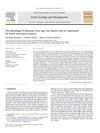 85 citations,
March 2012 in “Revista Brasileira de Farmacognosia”
85 citations,
March 2012 in “Revista Brasileira de Farmacognosia” The genus Sophora has compounds with potential health benefits and could lead to new drugs, but more research is needed to understand their effects and safety.
[object Object]  72 citations,
September 1997 in “Dermatologic Surgery”
72 citations,
September 1997 in “Dermatologic Surgery” Careful planning and patient counseling can lead to excellent hair transplant results, often in one or two sessions.
 61 citations,
November 2020 in “Molecules”
61 citations,
November 2020 in “Molecules” Conductive hydrogels show promise for medical uses like healing wounds and tissue regeneration but need improvements in safety and stability.
 59 citations,
June 2008 in “Journal of The American Academy of Dermatology”
59 citations,
June 2008 in “Journal of The American Academy of Dermatology” The article explains the genetic causes and symptoms of various hair disorders and highlights the need for more research to find treatments.
 46 citations,
November 2011 in “Forest Ecology and Management”
46 citations,
November 2011 in “Forest Ecology and Management” Understanding the fruiting patterns of Ficus trees can improve forest restoration by ensuring pollinators survive and biodiversity is supported.
 43 citations,
January 2013 in “Indian Journal of Dermatology, Venereology and Leprology”
43 citations,
January 2013 in “Indian Journal of Dermatology, Venereology and Leprology” The article concludes that advancements in hair cosmetics require dermatologists to stay informed about products and their potential risks, including allergies and higher risks for hairdressers.
 28 citations,
December 2011 in “Biocatalysis and biotransformation”
28 citations,
December 2011 in “Biocatalysis and biotransformation” PDI helps restore over-bleached hair's strength and structure by attaching special peptides.
 13 citations,
September 2016 in “Cosmetics”
13 citations,
September 2016 in “Cosmetics” Hair care cosmetics affect hair health; know products, ingredients, and procedures.
 2 citations,
July 2014 in “Irish Journal of Medical Science”
2 citations,
July 2014 in “Irish Journal of Medical Science” The meeting discussed medical findings, including benefits of certain treatments for cancer and heart conditions, and highlighted issues like poor adherence to preventive measures and skill gaps among interns.
 2 citations,
March 2005 in “International Journal of Cosmetic Science”
2 citations,
March 2005 in “International Journal of Cosmetic Science” Human hair structure varies by ethnicity, and certain treatments can improve hair condition and appearance.
 1 citations,
July 2020 in “Dermatology”
1 citations,
July 2020 in “Dermatology” Photobiomodulation helps reduce pain, lessen inflammation, heal wounds, and can be used in skin treatments. It also boosts hair growth in women with hair loss and may help fight microbes and prevent respiratory issues in COVID-19.
 1 citations,
March 2005 in “International Journal of Cosmetic Science”
1 citations,
March 2005 in “International Journal of Cosmetic Science” Twisting hair weakens it, but strength can be recovered at low twist levels.
 December 2023 in “International Journal For Multidisciplinary Research”
December 2023 in “International Journal For Multidisciplinary Research” Indian medicinal plants can help with hair growth and common hair issues.
 February 2023 in “International Journal of Advanced Research in Science, Communication and Technology”
February 2023 in “International Journal of Advanced Research in Science, Communication and Technology” Herbal shampoos with Neem and Tulsi might be safer and more effective for controlling dandruff.
 August 2022 in “International journal of research in pharmacy and chemistry”
August 2022 in “International journal of research in pharmacy and chemistry” Teak is a durable, termite-resistant wood with medicinal benefits.
 June 2018 in “International journal of trend in scientific research and development”
June 2018 in “International journal of trend in scientific research and development” The review explains how hair products work and the science of different hair types to help improve hair care research.
 January 2013 in “Springer eBooks”
January 2013 in “Springer eBooks” Hair care products are important for appearance and self-esteem, and choosing the right ones can help maintain healthy hair.
 March 2005 in “International Journal of Cosmetic Science”
March 2005 in “International Journal of Cosmetic Science” DVI provides detailed 3D imaging of hair and shows how various products protect and enhance hair.
 March 2005 in “International Journal of Cosmetic Science”
March 2005 in “International Journal of Cosmetic Science” A new method helps understand hair shine and various products improve hair care.
1 citations,
January 2021 in “European Journal of Inflammation” Methylated flavonoids may effectively reduce depression and inflammation caused by finasteride.
 February 2023 in “Vaccines”
February 2023 in “Vaccines” COVID-19 may harm male reproductive health and lower testosterone levels, potentially affecting fertility and causing erectile dysfunction. More research is needed.
35 citations,
November 2021 in “Journal of nanobiotechnology” Thymol-loaded nanoparticles are a promising, natural treatment for acne that avoids antibiotics and preserves healthy skin bacteria.
[object Object] 6 citations,
October 2022 in “Frontiers in Cell and Developmental Biology” Transplanted hair follicle stem cells can heal damaged rat intestines.
 2 citations,
June 2023 in “Gels”
2 citations,
June 2023 in “Gels” Injectable hydrogels are becoming increasingly useful in medicine for drug delivery and tissue repair.
1 citations,
August 2023 in “Animals” Chimp Haven uses a special system to check and improve the well-being of their chimpanzees, which could help other animal sanctuaries too.
 1 citations,
February 2021 in “Biodiversitas”
1 citations,
February 2021 in “Biodiversitas” Curcuma aeruginosa rhizome extracts show potential as anticancer agents, with varying effectiveness against breast cancer cells.
Aesthetic rehabilitation techniques can improve life quality and wellbeing for disabled patients.

Nanocarriers with plant extracts show promise for safe and effective hair growth treatment.
 August 2023 in “Bioengineering”
August 2023 in “Bioengineering” Bioprinting could greatly improve health outcomes but faces challenges like material choice and ensuring long-term survival of printed tissues.

Plant-based compounds can improve wound dressings and skin medication delivery.
























